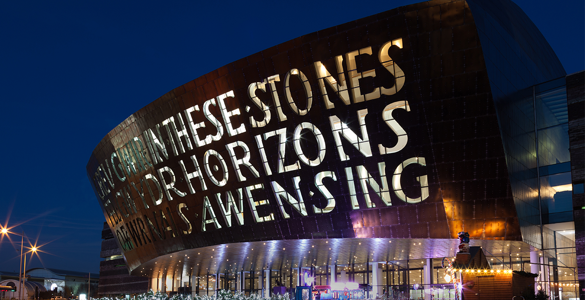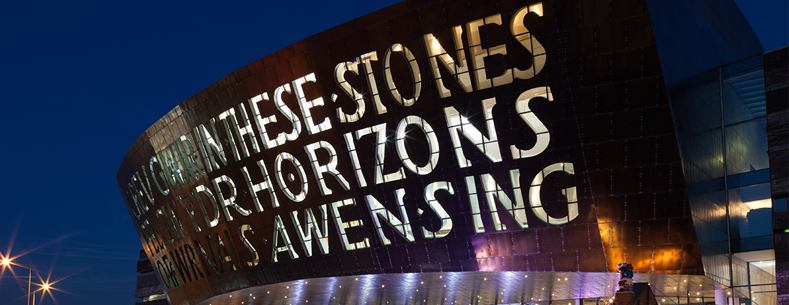On 24 June 2020 Plenary will debate the recent Culture, Welsh Language and Communications Committee report Impact of the COVID-19 outbreak on the arts sector. This blog post provides some background information on the major issues facing the sector.
On 16 March the UK Government advised that people “should avoid pubs, clubs, theatres and other such social venues”. Four days later, this advice became an instruction, as all nightclubs, theatres and cinemas were told to close by the UK Government.
This event turned off the taps for all artistic income derived from physical audiences. Many artistic events are not commercially viable with social distancing in place, so this activity may be one of the last to restart as we leave lockdown. The Culture, Welsh Language and Communications Committee has called for extended support for the arts from the Welsh Government so that arts organisations can hibernate rather than turning off the lights forever.
“An otherwise stable business model crashed overnight”
In recent years, arts organisations have been encouraged by public bodies to reduce their reliance on public subsidy. The Welsh Government’s 2016 culture strategy, Light Springs Through the Dark, described “a clear need for the culture sector to up its game on fundraising, marketing and income generation”. In 2018, the Culture, Welsh Language and Communications Committee called for the Welsh Government to back-up this call with “with an appropriate level of tailored and informed support” in its report, Building Resilience: an inquiry into non-public funding of the arts.
In a world of reduced income from Welsh Government and National Lottery sources, growing commercial revenue was a way to achieve financial resilience. With most commercial activity paused by lockdown, this model is inverted.
As the Arts Council told the Culture. Welsh Language and Communications recently:
Under normal circumstances we applaud organisations like Chapter, Galeri in Caernarfon and Wales Millennium Centre for their success in operating with a low dependency on public funding. But with around 80% of their income coming from commercial activities, an otherwise stable business model crashed overnight.
Most artistic performances are not commercially viable with social distancing in place. The Arts Council’s Nick Capaldi explained that if the Wales Millennium Centre were to open with current 2m social distancing rules, it could sell one seat in six. The Centre has cancelled all shows in 2020, with 250 jobs at risk, and has forecast that it could lose £20 million this financial year.
Theatr Clwyd feels that “there is no new financial model that makes sense - and income from live arts events cannot possibly cover costs with social distancing in place”.
Most creative freelancers have had “100% of their work cancelled”
Employment in the arts is dominated by freelancers. Since the crisis began, most creative freelancers have had, according to the Arts Council, “100% of their work cancelled”.
The unsuitability of the main UK Government forms of employment support for creative freelancers has been widely noted. Research conducted by Creative Cardiff and Cardiff University’s Creative Economy Unit suggests that eligibility criteria of the Self-employment Income Support Scheme “exclude significant parts of the freelance workforce”, and that compensation is a “a fraction of that received by furloughed PAYE employees”.
The House of Commons Treasury Committee published a report highlighting that over a million people have fallen through the gaps of the UK Government’s coronavirus support schemes. Its recommendations include:
Freelancers or those on short term contracts: In industries such as television and theatre, where short-term PAYE contracts are the norm, many workers are not entitled to support under the CJRS (Coronavirus Job Retention Scheme) or SEISS (Self-employment Support Scheme). This cannot be right. The Government should give this group access to financial support that equates to 80 per cent of their average monthly income, up to a total of £2,500 per month.
Support for the arts
On 7 April the Arts Council of Wales launched the £7 million Arts Resilience Fund. £5.1 million of this funding is from the National Lottery, with the remainder provided by the Welsh Government, trusts and foundations.
This package includes £1.5 million allocated to support individuals and £5.5 million to organisations. It is distributed through funds targeted both at responding to immediate financial hardship, and to enable individuals and organisations to adapt to the changing circumstances. All these funds are closed to new applicants.
“Welsh Government and the UK Government has to keep faith with this sector”
Nick Capaldi told the Culture, Welsh Language and Communications Committee that the Arts Council’s Resilience Fund “takes us as far as September”. With the Wales Millennium Centre deciding to stay shut until at least January 2021, it is highly unlikely that the problems currently facing individuals and organisations working in the arts will have gone away by then.
Mr Capaldi called for the “Welsh Government and the UK Government […] to keep faith with this sector”, warning that “it would be a tragedy if we were to reach October, having invested literally millions in keeping the sector in play”, and support was then to end. The Arts Council has already re-purposed funding to respond to the immediate pressures facing the sector. It is unclear if it has the resources to do so again this financial year.
The need to “keep faith with the sector” was endorsed by the Culture, Welsh Language and Communications Committee in its recent report, Impact of the COVID-19 outbreak on the arts sector. The Committee also called for:
- the UK Government Job Retention Scheme to continue beyond October 2020;
- the revision of the UK Government Self-Employed Income Support Scheme to ensure no freelance workers fall through the gaps in eligibility for the scheme; and
- the Welsh Government to recognise that our major arts organisations may not return to profitability for many years and be prepared to extend the necessary public funding to ensure their survival.
Article by Robin Wilkinson, Senedd Research, Welsh Parliament
We’ve published a range of material on the coronavirus pandemic, including a post setting out the help and guidance available for people in Wales and a timeline of Welsh and UK governments’ response.
You can see all our coronavirus-related publications by clicking here. All are updated regularly.






